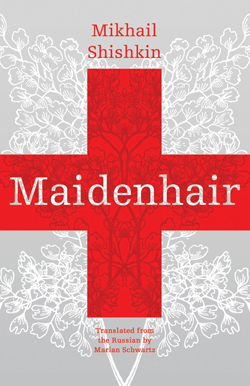Maidenhair
by Mikhail Shishkin, translated by Marian Schwartz
reviewed by Victoria Zhuang
The best twenty-first-century heir to the Thousand and One Nights may well be Maidenhair, Mikhail Shishkin’s beautiful 2006 account of a thousand tales which finally has been translated into English. A superb blend of history, realism, drama, and fantasy, it is a universe of stories all vigorously budding off from each other and later re-meeting back at their common source. Elegiac and stunningly inventive, it is distinguished by a rare virtuosity for storytelling in all forms.
The novel begins with a kind of storytelling survival contest: scores of people arrive at the gates of a political asylum in Switzerland, each peddling tales of rape, political activism, and personal tragedy like exhibitionist martyrs. They barter stories for life; the greater the suffering demonstrated, the better one’s chances. A man known only as “the interpreter” assists the guards in understanding these stories, while writing fantastic stories of his own to his son and reading through the diaries of a deceased Russian concert-hall singer.
The interpreter’s own storyline, compared with those of the asylum-seekers, appears surprisingly generic. Shishkin sums it up thus: “Before this the interpreter had lived in another building, and not alone, with his wife and son. And it came to pass that his wife was now someone else’s wife. This can happen in our empire, and in every other one, too. It’s nothing special.” Ironically this turns out to be one of the only two “real” stories in the novel. Most of the asylum stories turn out to be borrowed truths, not personally lived by the people who tell them.
It is the interpreter, as his title suggests, who oversees the telling of all these stories, which are so numerous and varied it’s a wonder Shishkin’s novel does not burst. Inside all the stories are more stories, and within those, Russian doll-style, further stories. Shishkin has Dostoevsky’s ability to summon intensity in a single sentence: “at the art school, a life model was posing with a sock on his phallus; he didn’t have the special little lace-up pouch.” Here, the inextricability of beauty from pathos that constitutes one of the book’s themes is represented in miniature.
In the course of the book, Shishkin merges these stories into a symphony of joy and despair. The interrogations of the asylum seekers become metafictional fantasies, then disembodied voices engaged in Socratic dialogues, in which questioner is indistinguishable from the answerer. All the characters become different facets of the same voice. “Your story is the groom and you’re the bride. Stories choose the person and start wandering.” This explains why all the stories are nestled together—in reality, they’re all the same. Some of their figures like to think they retain a more distinctive identity, attempting to resist this “bungling” of their separate storylines. But the novel, like the patient maidenhair ferns upon the ruins of Rome, eventually reclaims them all.
Shishkin’s language— artfully translated by Marian Schwartz— is a delightful pastiche of many storytelling genres: hard-boiled detective fiction, biblical language, fantasy, historical realism, philosophical discourse. Yet, on every page it is possible to recognize the master-storyteller. His description of a thawing winter landscape, for example, couldn’t be more perfect: “By midday the snow had become mealy, spongy, and the drifts had been eaten away as if by locusts, and under the elderberry the pimply crust had melted around the edges.” Through Shishkin’s unerring words we learn that the soul, like the body, has a unique smell; that the sound of tires over wet pavement is “a totally special sound, with a smacking and a moist whistling”; and that “silence is as much a word-created creature as the void locked in a room.”
Most of the stories the interpreter hears are derived from something else. “Even the interpreter himself seemed like a copy of a lost original.” But that doesn’t make any story less real. “The people here are irrelevant. It’s the stories that are authentic or not,” declares the “Question” figure at one point in the interrogation. Shishkin writes so well that his patently fictitious novel radiates delicate truths, which suggests that it’s also the way a story is received that is authentic or not. People’s lives can be changed by the stories they encounter. Maidenhair might even change yours.
Published on August 1, 2014

